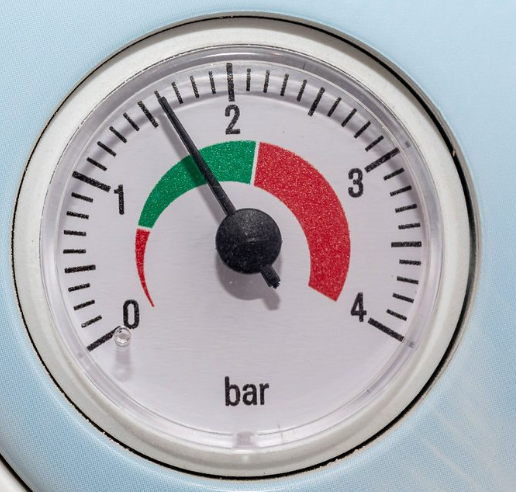The pressure gauge on your boiler provides important information about the health and performance of your heating system. But what do those numbers actually mean? Is a reading of 1.5 bar too high? Let’s break it down.

What is Boiler Pressure?
Boiler pressure refers to the balance of air and water circulating within the pipes and components of your central heating system. Some pressure is required to push the hot water through the radiators and taps in your home.
Ideally, the pressure should stay within a safe range – not too high or too low. The gauge on the boiler shows the pressure reading in bars.
What is the Normal Boiler Pressure Range?
- Between 1-2 bars is considered normal.
- 1-1.5 bars is ideal when the boiler is inactive.
- When the heating and hot water are in use, the pressure may rise to 1.5-2 bars which is fine.
Is 1.5 Bar Too High?
A reading of 1.5 bars is at the higher end of normal when the boiler is inactive. Once the heating or hot water taps are turned on and the system is under load, this reading would be considered perfectly acceptable.
Therefore, 1.5 bar is not necessarily too high. It is only a problem if the boiler pressure remains above 2 bars when the heating is off.
| Boiler Status | Normal Pressure Range | Action Needed? |
|---|---|---|
| Heating/Hot Water OFF | 1 – 1.5 bars | No – In ideal range |
| Heating/Hot Water ON | 1.5 – 2 bars | No – In normal range under load |
| Heating/Hot Water OFF | Over 2 bars | Yes – Pressure is too high |
| Heating/Hot Water ON | Over 2.5 bars | Yes – Have a professional inspect the boiler |
Why Does My Boiler Pressure Keep Rising Above 1.5 Bar?
If your boiler pressure keeps creeping up despite no use, there are a few possible causes:
- Too much water in the system – a build up over time through topping up.
- Faulty components like pressure release valves.
- Sludge build up blocking pipes and components.
- A general issue with an older boiler nearing the end of its lifespan.
What To Do If My Boiler Pressure is Too High
First check the reading when the boiler is inactive. If it is over 2 bars, you may need to bleed some radiators to bring it down. Open the radiator valve slowly and let water drain into a container until the gauge reads 1-1.5 bars.
If the problem persists, it’s best to call an engineer. They can properly diagnose issues with valves or components and flush the system if sludge is present.
For boilers over 10 years old, replacement may be the most cost effective option over repeated repairs. New boilers are very energy efficient and come with warranties.
Conclusion
A boiler pressure reading up to 1.5 bars is normal when the heating is on. Consistently higher than 2 bars when inactive does indicate a problem that needs addressing. Keep an eye on your pressure gauge and seek professional help if concerned. Your heating engineer can advise the best solution.
FAQs
Q: What is the ideal boiler pressure when the heating is off?
A: Between 1-1.5 bars is ideal for an inactive boiler.
Q: Is 1 bar too low for a boiler?
A: Yes, 1 bar is below the recommended range. Low pressure can cause problems.
Q: What pressure should my boiler be when heating/hot water is on?
A: 1.5-2 bars is fine when the boiler is active and under load.
Q: My boiler pressure is 2.5 bars when the heating is off. Is that too high?
A: Yes, 2.5 bars is considered high for an inactive boiler. You may need to bleed radiators.
Q: Should my boiler pressure ever be above 2 bars?
A: Readings above 2 bars when inactive indicate an issue that needs professional attention.
